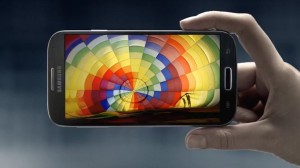Samsung explains why some Galaxy S4 benchmarks appear 'optimized'
 On Tuesday AnandTech published a report that suggested some sort of "trickery" was being used by Samsung to boost device performance when benchmarks are run. The Korean electronics manufacturer responded to the claims today, and while it does not deny that performance is adjusted when benchmarking tools are running, it refutes the suggestion that changes to the frequency of the Galaxy S4's GPU during benchmarking are "intended to improve [these] results".
On Tuesday AnandTech published a report that suggested some sort of "trickery" was being used by Samsung to boost device performance when benchmarks are run. The Korean electronics manufacturer responded to the claims today, and while it does not deny that performance is adjusted when benchmarking tools are running, it refutes the suggestion that changes to the frequency of the Galaxy S4's GPU during benchmarking are "intended to improve [these] results".
Investigations started after a post on the Beyond3D forum claimed that the GPU speed was usually limited to 480MHz but increased to 532MHz when certain whitelisted apps were running. Benchmarks using older testing apps gave worse performance results than newer ones for user frogblast.
AnandTech carried out various tests and found that GPU frequency was indeed capped at 480MHz when running a variety of games -- but when running GLBenchmark 2.5.1 this increased to 532MHz. So what could account for this 10 percent difference? Digging deeper, AnandTeh unearthed an intriguingly named string (BenchmarkBooster) in the benchmark APK. Alarm bells did ring.
Samsung's response is interesting. The company does not deny that there is a change in the GPU frequency, explaining that it does indeed have a maximum operating frequency of 533MHz (yes, 533, not 532MHz). The statement goes on to say that GPU frequency is "lowered to 480MHz for certain gaming apps that may cause an overload, when they are used for a prolonged period of time in full-screen mode".
It concludes by saying that "maximum GPU frequency of 533MHz is applicable for running apps that are usually used in full-screen mode, such as the S Browser, Gallery, Camera, Video Player, and certain benchmarking apps, which also demand substantial performance.
"The maximum GPU frequencies for the Galaxy S4 have been varied to provide optimal user experience for our customers, and were not intended to improve certain benchmark results".
